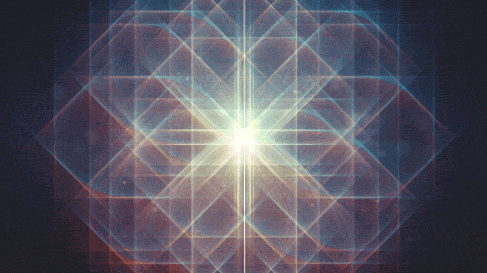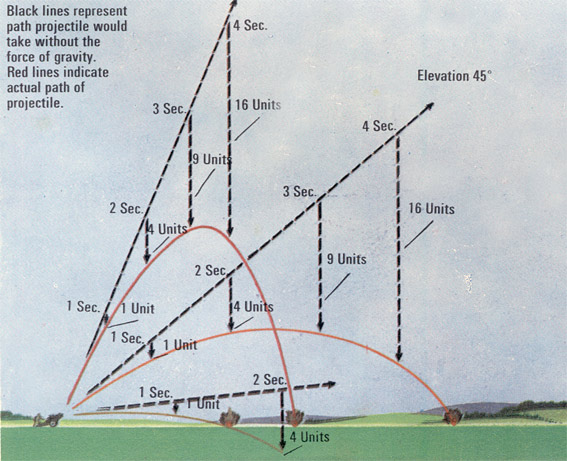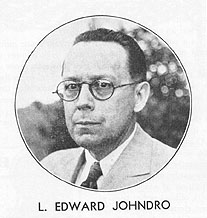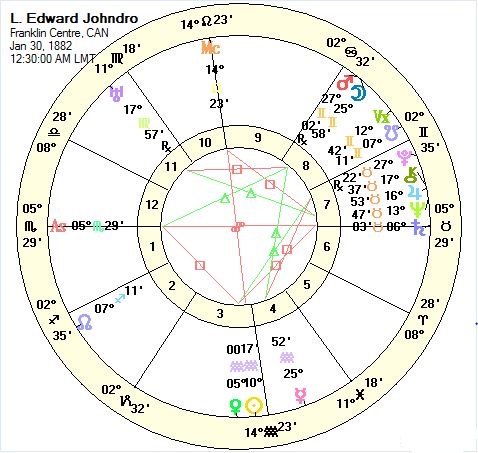In
Search Of:

The Hankar Crystal
October 2015
By Al. H. Morrison
Here’s
an astrological artifact of the
recent and not-so-recent past, from our eighth-house basement and
attic. It’s
the best explanation available of the most notable contribution of the
often-referenced but seldom-explained, mysterious Colonel Raoul Hankar,
who
noticed what was really happening in the skies over the Western Front
during
the Great War. Explained by one of the astrological greats that knew
him, Al H.
Morrison at
The Astrologers' Guild of America conference of March 19, 1972,
in New York City. Interestingly, it looks at the horoscope as an
evolving, resonant crystal, akin to our wafeform approach. Originally
transcribed and
published
in the Spring-Summer 1972 issue of The
Astrological Review when I was its editor – J.T.
Half
a Saturn cycle ago, we were founding
a technical journal, IN SEARCH, with Charles Jayne as Chairman of the
Editorial
Board. We had a lively time there in his downtown studio, with much
excitement
and debate over astrological matters. One of the most interesting of
the many
astrologers teaching there was Col. Raoul Hankar. While on duty as
ballistics
officer in the French Army (1914-1918), he had noticed correlations
between
visible planets and events on the battlefield. Then after the war he
had tested
his system against a set of 5,000 accurate birth charts of public
figures.
The
greatest merit of his system is that
it provides a reliable method of judging from the horoscope of an
unseen client
which characteristics are extrovert, readily visible to the beholder,
and which
are introvert, or subjective, quite real but not strongly or directly
reflected
in behavior. It is an extensive detailed astrology, based on a
particular
cultural value system.

 French Col. Raoul
Hankar was an artillary officer in WWI, whose mathematics shaped his
theories.
French Col. Raoul
Hankar was an artillary officer in WWI, whose mathematics shaped his
theories.
What
I am trying to explain here is a very
small fragment of that astrology, somewhat out of context, a way of
judging the
psycho-mental phenomena, the way the native balances logic, emotion and
direct
psychic knowledge, or as the shrink industry terms it, instinct,
automatic
behavior, or lately, genetically programmed. This measure is not
particularly
an I.Q. test, although when thoughtfully done it comes much closer to
accuracy
in predicting I.Q. than many other observational efforts.
Consider
first the apparent motion of the
Moon during the date of the birth. Anything less than 13 degrees 10
minutes is
"slow"; anything greater is "fast." There is quite a range
in the apparent motion of the Moon as we see it from the surface of the
Earth.
For this purpose, the greater the difference from the mean motion, the
more
importance one attaches to the distinction, "slow" or
"fast." Where the Moon is slow in its apparent motion, the native's
perceptual capabilities are focused, or directed toward observing
whatever the
native is motivated to seek, or has been conditioned to pay attention
to, or
whatever he fears. Other information is simply not perceived, not
observed.
This leaves the mind relatively lightly burdened, with a minimal input
of
perceived data to process.
The
"fast" Moon, on the other
hand, scans rapidly with a wide-open search pattern. If there is
anything going
on, anything new or unfamiliar, anything differing from expectation, it
is
instantly perceived. In a complex environment, as most social
environments are,
there are so many details and processes to notice that the "fast"
Moon native has his mind receiving an avalanche of input, fresh data.
Where
Mercury is located ahead of the Sun,
so that when next the Sun rises, Mercury will have risen before it as a
Morning
Star, and particularly when Mercury itself has a fairly rapid apparent
motion
for the birth date, the mind has a direct and rapid faculty for filing,
digesting the information brought in by the senses. Learning is quick,
with
little need for repetition.
Observing the night skies
during bombardments, Col. Hankar evolved his concepts.
Where
Mercury follows the Sun, being an
Evening Star still visible after the Sun has set for the day, the
digestion of
the incoming information is slower, deliberate, and more complex. Data
are not
simply filed, so to speak, but cross-referenced, tested, to see if they
relate
to anything else in or out of the system or set being perceived. Where
the
apparent motion of Mercury is slower than average, this handling of
incoming
information is slower still, and more thorough.
Where
Mercury is retrograde, a sort of
double-take is normal. Everything is considered twice. There is a
greater
capacity to retain information in perspective, or context, and to edit
or
re-learn in a different scheme.
The
consideration of the apparent motion
of the Moon together with the placement of Mercury relative to the Sun
is what
Marc Edmond Jones calls 'Mental Chemistry.'
In
Jones' formulation the combinations of
"fast" moon with Mercury behind the Sun and "slow" Moon
with Mercury ahead of the Sun are no problem. The mind is reasonably
balanced,-sufficiently challenged to make pragmatic sense of its
environment to
promote normal mental functioning.
This
has nothing to do with what is called
intelligence, or I.Q. I have noticed that much of what passes for high
I.Q. is
merely a very rapid over-use of what would be mediocre or poor
faculties if
paced at usually experienced rates. It's as if I have a jeep and work
like hell
to make 40 trips a day, I can haul much more freight than somebody with
a
Cadillac who makes a leisurely half-trip a day.

 Astrologer
L. Edward Johndro, an engineer himself, knew Hankar and
promulgated his observations.
Astrologer
L. Edward Johndro, an engineer himself, knew Hankar and
promulgated his observations.
One
of Dr. Jones' good friends and
colleagues, Mathilde Shapiro, used to be fond of twirling her Phi Beta
Kappa
key while explaining that she has a very slow mental chemistry: very
slow rate
of Moon daily motion, Mercury behind the Sun and retrograde. Here, of
course,
is the example of the superior mind deliberating so rapidly that a
courtroom
stenographer would have difficulty keeping up with her very coherent
lecturing.
I
am something of the opposite case: Moon
making more than 13 degrees 10 minutes a day, Mercury ahead of the Sun
going
faster than average, in the sign next ahead of the Sun's sign, and with
a
planet in between Mercury and Sun. With all this working, I have no
option but
to jump to conclusions. With me, very little gets past my perceptions,
but I
must instantly decide once and for all whether it means anything to me,
and if
so, what it does mean, and what I can or should do about it, if
anything. All
this has to happen instantaneously. This forces the whole process into
automatic levels below such operations as logic, into what amounts to
unconscious correlation. There is no cross-reference function to
mention.
This
enables me to cope with the flood of
incoming perception easily, and in some ways I am hypersensitive,
picking up
more than most other people apparently do. But it also makes for poor
recall;
unless the datum has some impact, some emotional marking, I seem to
file it
peripherally and it is quickly lost. I constantly leap to conclusions,
being
fairly accurate, and in constant difficulty with people who don't do
the same,
who can't imagine how I got to the decisions I've made, and the like.
And to
try to show them, what happens is that I have to use my logical
faculties to
invent specifically for them some chain of cause-effect or some
extrapolation
from agreed-upon facts that will justify what I knew at once without
conscious
thought. It is not funny, nor is it any sort of superiority, merely
another
mode of mental activity, the way a particular mind can work.
Cazimi
Mercury
Now
when Mercury is cazimi, actually
directly in line with us and the Sun so that a telescope would pick it
up as a
speck moving over the visible disc of the Sun, that is one condition:
the
energy of the Sun is focused through the planet and its energy field,
whatever
it may be, or astrologically, the drive of the ego, or the I AM force
of the
native is transmuted to flow through his psycho/mental processes as
through a
channel. For such an individual the animal nature is sublimated into
intellectual or abstract manifestations. It can mean genius, or
somebody who
actually finds beauty in exact mathematical patterns, equations, etc.
The other
one, with Mercury on the far side of the Sun and hidden behind it,
works in
reverse.
The
animal, or physical energy of the
native simply overrides whatever intellectual talents he has, so that
he does
what he does and thinks about it later, if ever. Again, there is no
direct
measure of I.Q. as such. Some of these Sun occulting Mercury people do
have
excellent mentality, high I.Q.
You
may find cazimi defined as merely the
inferior and superior conjunctions of Mercury with Sun, not necessarily
occulting or being occulted. In these less accurate alignments between
us,
Mercury and the Sun, the same general characteristics are seen in the
native,
but not to such intensity.
What
Col. Hankar did was to consider the
relative positions of the Moon, Mercury, Uranus and the Ascendant. Now
here,
the birth chart must be very accurately calculated. One takes very
narrow orbs,
and the Ascendant moves rapidly, perhaps more rapidly than the
Midheaven.
The Hankar Crystal is
formed by the relationship of the Moon, Mercury, Uranus, and Ascendant.
For
this purpose, any fraction of the
circle, rational or irrational, is an aspect. Likewise, as a
modification, I
have added any multiple of 15 degrees of an aspect, or mathematical
derivative
of some fraction of the circle.
In
order to see this set of relationships
of 3 bodies and a point, I draw off a diagram separately from the chart
wheel,
thus: (illustration) so that a trapezoidal figure is formed. I have
named this
diagram: Hankar Crystal. On each of the lines is written whatever
angular
distance there is indicated by the line. Only very rarely is the
diagram
symmetrical. I do not know that it would mean anything specific - it
might. I
have not seen enough of them to know. One of my students has a whole
notebook
full of thousands of these diagrams, for study, to search for some
correlation
between shape of the Hankar Crystal and some visible characteristic of
the
natives.
For
interpretation, one takes up the
traditional Key Words for these bodies and this point, Ascendant.
Where, for
example, the fast Moon is related to the Ascendant by an exact aspect,
and
here, a so-called minor aspect is just as important and strong as a
so-called
major aspect, then the immediate response of the individual tends to
flow as
visible reaction. You can read his feelings in his face, his actions,
his
voice.
Mercury vs. the Moon
Where
the Mercury is more exactly aspected
with the Ascendent and the Moon is not in any definite aspect, or with
too wide
an orb, then you get another native whose mind is the part that shows,
rather
than his spontaneous impulses or emotional reactions. Any aspect of
Uranus
sharpens and intensifies the action. Where the Uranus-Mercury aspect is
more
exact and the Uranus-Moon relation is only vague, you get a quite sharp
mind
with a delay or unwillingness to put into immediate response what the
mind's
scanning has formulated, the man who thinks of millions of things to
do, but
who may perhaps do none of them.
Where the Mercury is not tightly bound
into
the Hankar Crystal, and the other things are, you may have an
individual who
dispenses with routine or logical cerebration, who functions on
emotional or
physical feel-your-way sort of trial and error, or one who goes on
direct
psychic sensitivity, according to what is most tightly connected in the
Hankar
Crystal. Where the Ascendant is not closely related to any of these
bodies, you
have the individual who doesn't readily express overtly what is going
on within
his mind/psyche. You are not to be unhappy if you find you have few or
no exact
aspects in your own Hankar Crystal. To have all the lines marked thus
is
reserved for genius, and not many of us qualify. The relative
equilibrium is
more important.
Another
thing which I have done with the
Hankar Crystal, which Col. Hankar did not, so far as I know, is to
progress
this diagram. Naturally, everything in it progresses at its own varying
rates,
speeding and slowing, so that the Hankar Crystal evolves from its
original form
through an eventually cyclic series of transformations. Thus, there
would be periods
of the life of higher intellectual creativity, other periods of
stronger
emphasis on physical expression, many phases overlapping and generating
something analogous to interference patterns or beat notes.
Character
Core
The
Hankar Crystal can be thought of as a very
sophisticated, complex Arabian Part, if you like. You can take the
Hankar
Crystal as the core of the character structure, interpret it as such,
then add
unto it one by one the other planets and the Sun, somewhat like
decorating a
Christmas Tree. For example, taking Venus into account shows you
something of
the motivation, how fluently it is aroused, what channels it finds its
readiest
expression, how to judge what the native wants.
Another
way of looking at the Hankar
Crystal is to see it as functioning in the whole organism somewhat like
the
quartz and other crystals the physicists use in regulating,
standardizing, and
controlling flow or radiation of energy. Whatever energy is put into a
crystal
comes out in a specific output related to the nature of the crystal and
its
structural pattern. Any stress is reflected in what the crystal is
tuned to
project, as a particular frequency of radio waves, or a specific
electrical
voltage. Col. Hankar, of course, would not have accepted either of
these
considerations. Remember that what I have done here is to take a very
small
part out of a rather complete system of astrology, so that it
necessarily is
out of context.
 Al H. Morrison, an influential and sometimes
controversial twentieth-century astrological pioneer, was president of
the Astrologer's Guild of America when this piece was first
presented. More on his many contributions here...
Al H. Morrison, an influential and sometimes
controversial twentieth-century astrological pioneer, was president of
the Astrologer's Guild of America when this piece was first
presented. More on his many contributions here...

